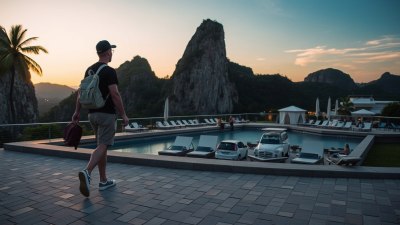What Happens When Your ‘Relaxing Vacation’ Turns Into a Marathon of Activities
Explore the irony of a packed vacation schedule and its impact on relaxation.

Vacations are often seen as an escape from the daily grind, a time to relax, unwind, and recharge. However, many travelers find themselves in a paradox where their 'relaxing vacation' morphs into an exhaustive marathon of activities. This phenomenon is not uncommon; in fact, it poses several challenges to our initial plans of relaxation. Understanding the dynamics behind this shift can help create a better travel experience.
For many, the notion of a vacation means squeezing in as many experiences as possible. The excitement of visiting a new destination invites travelers to pack their itineraries with activities—from sightseeing to adventure sports and culinary classes. This approach, while thrilling, can often lead to burnout and stress, which is contrary to the fundamental purpose of a vacation.
The Allure of Adventure
The thrill of adventure is undoubtedly a captivating aspect of travel. When planning a vacation, travelers often find themselves drawn to the unique offerings of a destination. Whether it's hiking through breathtaking landscapes, indulging in local cuisine, or exploring cultural landmarks, the temptation to engage in various activities can be overwhelming.
Social media plays a significant role in shaping our perception of travel. Influencers showcase seemingly perfect vacations filled with exhilarating activities, leading many to believe that the ultimate travel experience necessitates a hectic schedule. As a result, travelers may feel compelled to emulate these experiences, fearing that a 'lazy' vacation will equate to a missed opportunity.
The Negative Impact of Over-Scheduling
While engaging in stimulating activities can be enjoyable, over-scheduling can lead to feelings of exhaustion and frustration. The constant hustle from one activity to another can leave little room for relaxation. Here's a closer look at the limitations of an overly ambitious itinerary:
- Physical Fatigue: A whirlwind of activities often demands a lot from the body. Hopping from one attraction to another can result in exhaustion rather than relaxation.
- Mental Overload: The pressure to see and do everything can create a sense of anxiety. The fear of missing out (FOMO) might interfere with a traveler’s ability to enjoy the moment.
- Emotional Stress: The pursuit of a perfect vacation can lead to tension, especially when faced with unexpected changes or delays.
To truly unwind, it is essential to balance activities with periods of rest. By allowing time to decompress, travelers enhance their overall vacation experience. It's not just the destination that matters; the journey there, including moments of peace, can greatly affect how effectively one is able to relax.
Finding Balance: The Art of Relaxation
Achieving a sense of balance during a vacation requires conscious effort. Here are some strategies to incorporate relaxation into your travel plans:
- Set Realistic Goals: Prioritize activities that genuinely interest you and allow for sufficient downtime. Rather than cramming multiple experiences into one day, focus on the quality of each activity.
- Savor the Moment: Take time to appreciate the surrounding environment. Enjoy a leisurely meal, take a walk on the beach, or find a cozy spot to read a book. Being present enhances the experience.
- Schedule Downtime: Incorporate break periods into your itinerary. Designate specific times for relaxation, whether it’s lounging by the pool, meditating, or simply enjoying scenic views.
Balancing activity and relaxation can significantly enhance your vacation. Taking the time to recharge allows you to engage more fully when participating in activities, as well as enjoy the unique opportunities a destination has to offer.
The Role of Mindset
Your mindset plays a critical role in how you experience your vacation. Shifting from a productivity-focused mentality to one that emphasizes enjoyment can make all the difference.
Instead of treating a vacation as a checklist of activities to complete, consider it an opportunity for personal growth and enjoyment. Allow flexibility in your plans; sometimes the best experiences are those that are unplanned. Embrace spontaneity, and give yourself permission to explore at a leisurely pace.
Communicating with Travel Companions
If you're traveling with family or friends, discuss individual expectations before the trip. Understanding what each person wants to achieve during the vacation can help balance the itinerary. You might find that everyone has a different perspective on what 'relaxation' means. Some may prefer an active adventure-style trip, while others focus on downtime.
Creating a collaborative plan can enhance group dynamics and ensure that everyone has a memorable experience. Schedule some group activities, but also allocate time for individuals to pursue their interests, fostering a sense of satisfaction for all parties involved.
Recognizing Signs of Burnout
Being aware of your mental and physical state can help prevent burnout during a vacation. Look for signs, such as:
- Tiredness and fatigue
- Frustration or irritability
- Lack of enthusiasm for planned activities
- A feeling of rush or agitation
When you notice these signs, take a step back. Consider rearranging your itinerary or even taking a day off from activities. Remember, it's okay to prioritize well-being over ticking off destinations on a list.
Kids and Family Vacations
Traveling with children can add an extra layer of complexity to vacation planning. Kids may require more downtime to recharge, and their energy levels can vary considerably throughout the day.
Incorporate kid-friendly activities that allow for breaks. Plan trips to parks or beaches where children can play freely, allowing parents time to relax. Creating a family itinerary that includes both active adventures and slower-paced activities can help maintain harmony within the group.
The Ultimate Takeaway
Ultimately, the purpose of a vacation is to serve as a respite from everyday life. Consciously choosing a schedule that allows for relaxation and enjoyment can transform the way you view and experience travel.
A vacation should be a time to rejuvenate, explore, and embrace new experiences without the pressure to fit everything in. By intentionally crafting a balanced itinerary, practicing mindfulness, and considering the needs of everyone involved, you can turn a potential marathon of activities into a truly relaxing getaway.
In conclusion, if your next vacation threatens to turn into an activity marathon, remember the importance of slowing down. Appreciate every moment, whether it's an exhilarating adventure or a serene afternoon spent soaking in the sun. Happy travels!











